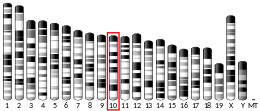SHPRH
E3 ubiquitin-protein ligase SHPRH is an enzyme that in humans is encoded by the SHPRH gene.[5][6]
Function
SHPRH is a ubiquitously expressed protein that contains motifs characteristics of several DNA repair proteins, transcription factors, and helicases.[supplied by OMIM][6]
gollark: <@241757436720054273> LXDË?
gollark: Go icositetrachoron yourself.
gollark: 1. It is a stupid and highly triangular rule2. Unicode magic™ technically doesn't match the regex
gollark: <@319753218592866315> 2021
gollark: ?remind 1y stop using the default help command
References
- GRCh38: Ensembl release 89: ENSG00000146414 - Ensembl, May 2017
- GRCm38: Ensembl release 89: ENSMUSG00000090112 - Ensembl, May 2017
- "Human PubMed Reference:". National Center for Biotechnology Information, U.S. National Library of Medicine.
- "Mouse PubMed Reference:". National Center for Biotechnology Information, U.S. National Library of Medicine.
- Sood R, Makalowska I, Galdzicki M, Hu P, Eddings E, Robbins CM, Moses T, Namkoong J, Chen S, Trent JM (August 2003). "Cloning and characterization of a novel gene, SHPRH, encoding a conserved putative protein with SNF2/helicase and PHD-finger domains from the 6q24 region". Genomics. 82 (2): 153–61. doi:10.1016/S0888-7543(03)00121-6. PMID 12837266.
- "Entrez Gene: SHPRH SNF2 histone linker PHD RING helicase".
Further reading
- Motegi A, Sood R, Moinova H, Markowitz SD, Liu PP, Myung K (December 2006). "Human SHPRH suppresses genomic instability through proliferating cell nuclear antigen polyubiquitination". The Journal of Cell Biology. 175 (5): 703–8. doi:10.1083/jcb.200606145. PMC 2064669. PMID 17130289.
- Unk I, Hajdú I, Fátyol K, Szakál B, Blastyák A, Bermudez V, Hurwitz J, Prakash L, Prakash S, Haracska L (November 2006). "Human SHPRH is a ubiquitin ligase for Mms2-Ubc13-dependent polyubiquitylation of proliferating cell nuclear antigen". Proceedings of the National Academy of Sciences of the United States of America. 103 (48): 18107–12. doi:10.1073/pnas.0608595103. PMC 1838714. PMID 17108083.
- Jin J, Smith FD, Stark C, Wells CD, Fawcett JP, Kulkarni S, Metalnikov P, O'Donnell P, Taylor P, Taylor L, Zougman A, Woodgett JR, Langeberg LK, Scott JD, Pawson T (August 2004). "Proteomic, functional, and domain-based analysis of in vivo 14-3-3 binding proteins involved in cytoskeletal regulation and cellular organization" (PDF). Current Biology. 14 (16): 1436–50. doi:10.1016/j.cub.2004.07.051. PMID 15324660.
- Adams MD, Kerlavage AR, Fleischmann RD, Fuldner RA, Bult CJ, Lee NH, Kirkness EF, Weinstock KG, Gocayne JD, White O (September 1995). "Initial assessment of human gene diversity and expression patterns based upon 83 million nucleotides of cDNA sequence" (PDF). Nature. 377 (6547 Suppl): 3–174. PMID 7566098.
This article is issued from Wikipedia. The text is licensed under Creative Commons - Attribution - Sharealike. Additional terms may apply for the media files.



